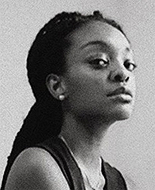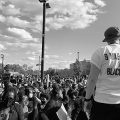
By Danae Reid

The Black community has a history of being homophobic and transphobic, and those behaviors have recently been called out as the Black Lives Matter continues to lead. This week, I was fortunate enough to talk to two Black trans women about the premature deaths of Black trans women, their experiences with Black men, and more. This is the first in a two-part series about conversations with Black trans women.
DR: Tell us a little about yourself, your name, your story, etc.
AJ: My name is Andy Jean. I am an undeniably Black and trans costume designer, stylist, and storyteller. The journey to finding me has been ongoing and revelatory. I had to accept that love would only find me if I loved me first. 100%.
I moved to New York in order to start living. I was fortunate enough to train at [the] New York University Tisch School of the Arts, and found my tribe — a family of individuals who not only loved me, but saw me, and then they held up a mirror so that I too could see myself. I am constantly inspired by my ancestors, James Baldwin, Marsha P. Johnson, and Dr. Maya Angelou; they all held spaces for themselves despite living in such radical times. My story is that I am here to live — to live boldly and beautifully.
I never imagined the day I would be able to tell my parents who I really am, I didn’t imagine that I could march down the street and be cheered on and celebrated by my community. Fear kept me from loving me.
DR: This past week, Black men have been called on to do better as far as the Black woman is concerned. What has your experience been with Black men?
AJ: Ha!!! I love my Black brothers!!! I have five Black brothers. My experience with Black men has been tumultuous and often in secret. No More. There is a difference between advocacy and intimacy. I will continue to fight for our Black brothers. They are viewed as less than and discriminated against — but turn around and treat me just as bad.
My relationships were challenging. With one fist I am proclaiming my support, and the other fist being used to fight them back. It is painful. I have to protect myself from the same man who finds me attractive and then calls me a “f**got” or “tranny” because his boys are walking by — to be asked for my number and ridiculed in the same moment. That has been my experience with Black men. They find my body alluring, they want to be intimate with me, but won’t hold my hand at the train station.
So I respond, ‘will you walk with me to the bodega? I hear no, then the answer is no — I can’t give you my number.’ Why should I continue to perpetuate the trauma, his lies, and insecurities? I am more than just the physical — I am human. I have feelings and I want to be loved, not just desired. I ask my Black men to please do better. If you are not ready to display your truth, don’t kill me for living in mine.
DR: Brooklyn, New York just hosted a massive “Black Trans Lives Matter” rally in response to the racial injustices our community faces at the hands of White supremacy, and more specifically, as a direct response to the most recent murders of Dominique “Rem’Mie” Fells, 27, of Philadelphia, and Riah Milton, 25, of Cincinnati, Ohio –two additions to a long list of named, both known and unknown. Why is it more important, now than ever before, that those who are not in the trans community make the effort to educate themselves?
AJ: Knowledge is power! Knowledge is power!
I was present at the rally in Brooklyn and felt for the first time that we were being heard. We can’t regress at this point. We are in a revolution; a revolution for equality, access, and complete liberation. We have to free our minds from the colonial training and framework that has kept Black people isolated and divided.
We can’t forget a few years ago a Black man was killed on tape uttering his final words, “I CAN’T BREATHE”. In March, we were instructed to stay home to slow COVID-19 from devastating our country, but we were then forced to run into the streets to dismantle White supremacy and injustice. However, during that same time, two of our sisters were killed and chopped up. It’s unacceptable. We are fighting to be treated fairly, but don’t even see the trans people in own community fighting for the same thing; the very community that has been the source of innovation, culture, and style.
DR: Far too often, press coverage of the Black community and the trans community are both marred by violent or prurient stories that speak little to the fullness of who we are. Then when “Black” and “trans” are put together in the same conversation, that coverage only gets darker. What’s something you’d like people to know about the history of Black trans women that is often not explored in mainstream media?
AJ: Marsha P. Johnson and Sylvia Rivera were integral leaders and pioneers for change. They advocated for EVERYONE to have EQUAL rights including women, Black people, queer people, and disabled people. Ms. Rivera was an avid fighter alongside the Black Panther Movement. People need to know. These women are due their roses.
DR: Follow up: I’d love to hear about some of your accomplishments and things you’re proud of.
AJ: I am very proud to collaborate with incredible storytellers, directors including Whitney White, Jenna Worsham, and Stevie Walker-Webb!
I have designed costumes for theatrical productions like, “What To Send Up When It Goes Down” by Aleshea Harris, “Amen Corner” by James Baldwin,”One in Two” by Donja R. Love, “Our Dear Dead Drug Lord” by Alexis Scheer and “Siblings Play” by Ren Dara Santiago.
To learn more about Andy Jean, visit her Instagram page at: @Qween_Jean.
Disclaimer: The views, thoughts, and opinions expressed in the article belong solely to the author, and not necessarily to the author’s employer, The Philadelphia Sunday SUN, the author’s organization, committee or other group or individual.
















Leave a Comment